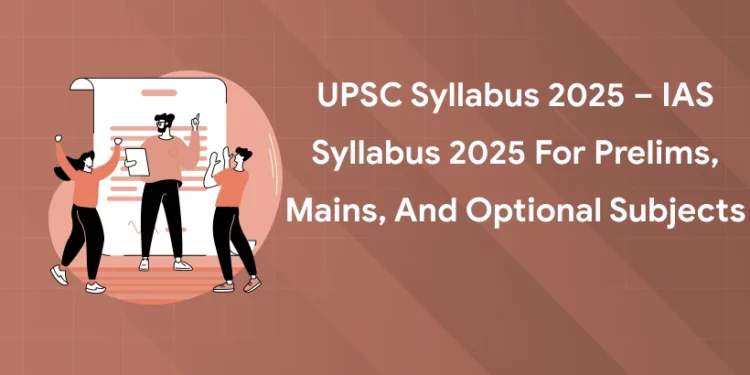Table of Contents
UPSC Syllabus 2025: UPSC civil services or IAS exam is one of the most prestigious exams for government jobs. Many of them wish to be an IAS officer, but it is not so easy as it seems. The candidates have to face two written exams and a personal interview. Such examinations require extremely good knowledge about subjects to score good marks in them and the interviews. However, only when you know the Upsc syllabus properly, you may prepare well for the exams. It helps you know what you need to study.
If you don’t follow the syllabus, then it would be really hard for you to prepare. The UPSC syllabus is vast and it’s long, and you have to cover everything. Knowledge of the syllabus is important to get the best books. That will help you make sure that the book covers all the topics in the syllabus and you get the best one to prepare.
What is the UPSC Syllabus 2025?
The official UPSC exam notification 2025 will be published on 22nd January 2025; therefore, applicants must refer to the new UPSC 2025 syllabus available with it. The UPSC syllabus has been well-defined for both Prelims as well as Mains which will give you an overview and a better understanding of the nature of the exam.
To get started, there are 3 stages in the UPSC Civil service examination, which are as follows:
- UPSC Prelims : This is the initial level that falls in the UPSC exam cycle. There are 2 papers and it comprises of a total of 100 and 80 objective–based questions respectively.
- UPSC Mains : The second in line is the Mains exam. There are a total of 9 papers and the exam is descriptive in nature.
- Personality Test: There is the final round, which involves Personal Interviews are done so as to assess the personality of the candidate.
How do I get to know the UPSC Civil Services Syllabus?
UPSC publishes the syllabus annually and puts it up on its official website. You can refer to the UPSC website and can download the syllabus from there. The Civil services exam has been categorized into three types; two written exams are conducted along with a personal interview. For the preliminary exam, you are required to answer objective types of questions. On the other hand, questions in the main exam are of descriptive type.
There are two papers, namely Paper I and Paper II. For each paper of 200 marks, the examination takes two hours.
Crack UPSC with Expert Mentors! Enroll Here!
Syllabus for UPSC Prelims Exam 2025
Paper I
- Current affairs, national and international events.
- India’s freedom struggle and the History
- India and World Geography.
- Indian Politics, Constitution of India, Political System, Public Policy, Panchayati Raj,
- Indian Economy, Micro, and Macro Economics, Poverty Index, Demographic Disparage, Social Sector Reforms.
- General issues on Environment, Ecology, Biodiversity, Climate Change.
- General Science up to Class X.
Paper-II
- Comprehension
- Communication and interpersonal skills
- Decision making and problem-solving;
- Logical reasoning and analytical ability
- General mental ability
- Numbers and their relations, orders of magnitude, (up to Class X level), Interpretation of data (charts, graphs, tables, etc. of Class X level
UPSC Prelims Syllabus 2025 Download PDF
Candidates who want to appear for UPSC Public Service mains Examination can download UPSC Syllabus PDF Here. Click on the link below to download UPSC Syllabus,
IAS Syllabus for Mains Exam 2025
The main exam is taken to assess the candidate’s depth of understanding and intellect. So, it requires the aspirants to have in-depth knowledge of the subjects. Here is the syllabus for the Main Exam. It consists of 7 papers including two optional.
- Paper – I: Essay
- Paper-II: (Indian History, Culture, Heritage, Geography of the World and Society)
- Paper – III: (Indian Politics, Constitution, Administration, Social Justice, and International relations)
- Paper – IV: (Environment, Technology, Economics, Bio-diversity, Disaster Management)
- Paper – V: (Ethics, Integrity, and Aptitude)
- Paper – VI: Optional Subject I
- Paper – VII: Optional Subject II
UPSC Mains Detailed Syllabus 2025 Download PDF
Candidates who want to appear for UPSC Public Service mains Examination can download UPSC Syllabus PDF Here. Click on the link below to download UPSC Syllabus,
UPSC Mains Syllabus for Optional subject (2 papers – Paper 1 and paper 2)
For the optional subject papers, you need to choose a subject of which you have an in-depth understanding.
The UPSC allows you to choose one optional subject from out of a total of 26 different subjects. There’ll be 2 papers, Paper 1 and Paper 2 of 250 marks each pertaining to the subject that you choose.
Having said that, I have shared a table listing all the optional subjects for UPSC, below:
| UPSC Optional Subjects | |||
|---|---|---|---|
| Agriculture | Animal Husbandry & Veterinary Science | Anthropology | Botany |
| Chemistry | Civil Engineering | Commerce and Accountancy | Economics |
| Electrical Engineering | Geography | Geology | History |
| Philosophy | Political Science and International Relations | Psychology | Public Administration |
| Physics | Sociology | Law | Mathematics |
| Management | Medical Science | Statistics | Mechanical Engineering |
| Zoology | |||
UPSC Syllabus for Language Papers: (Any Indian Language & English)
Literature subjects for language papers likewise the UPSC optional subjects, are a part of the Mains Exam, in these papers there’d be:
-
- An essay question of 100 marks where you’d have to select one out of a few given topics.
- 5-6 questions related to reading comprehension: of a maximum of 60 marks.
- Precis writing questions worth 60 marks which you’d have to attempt on special answer sheets with grid lines.
- Translation-based questions: English to the chosen Indian language & vice versa for 20 marks each, totaling 40 marks.
- Questions based on grammar, synonyms, sentence corrections, and basic language usage, of a total of 40 marks.
While English language is a compulsory subject for language paper, the following is the list of 22 subjects from which you can pick your most appropriate literature subject for language paper:
| UPSC Languages | |||
|---|---|---|---|
| Manipuri | Marathi | Nepali | Oriya |
| Punjabi | Sanskrit | Santhali | Sindhi |
| Assamese | Bengali | Tamil | Bodo |
| Hindi | Konkani | Telugu | Dogri |
| Kannada | Maithili | Urdu | Gujarati |
| Kashmiri | Malayalam | English | – |
Factors for Choosing Optional and Language Subjects
It is imperative that you choose your optional and language subjects after proper consideration. These are some factors that you should keep in mind:
- Analyzing the optional subjects: My initial advice is to analyze the optional syllabus. It’s important to consider the length of the syllabus and the general studies subjects to be covered.
- Familiarity with the subject: Although aspirants come from different streams, the optional subject should be a leverage. Therefore, it’s advisable to choose an optional subject that you are familiar with.
- Having reliable study materials: Preparing for a 500 marks optional paper is no cakewalk and require appropriate study resources. Ensure you have access to good study material for the relevant subject.
- Choosing a subject of interest: Avoid going after a subject with high success ratio. Instead, select a subject based on your interest. You will be assessed on your answers’ understandability, thus you should pick a subject that you have an interest in or are comfortable with.
The best strategy is to score about 52-55% in your optional paper to ensure an overall good score as the marks obtained in optional and GS papers can determine the final selection of a candidate.
In case you have commerce and management as your subjects, you can check the UPSC commerce and management syllabus we have provided.
What is the syllabus for the IAS Interview?
There is no specific IAS Interview syllabus per se, as the purpose of this interview is to assess the personality of the candidate for a career in public service by a Board of competent and unbiased observers.
Some of the qualities to be judged are mental alertness, critical powers of assimilation, clear and logical exposition, balance of judgement, variety and depth of interest, ability for social cohesion and leadership, intellectual and moral integrity.
Crack UPSC with Expert Mentors! Get Free Demo Classes!











